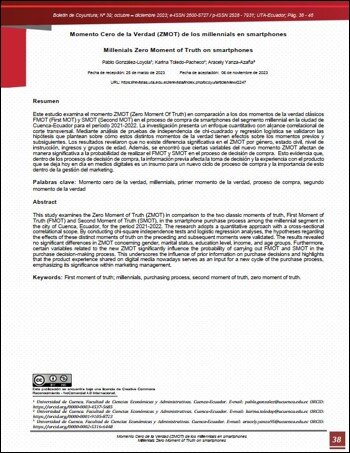Millenials Zero Moment of Truth on smartphones
Main Article Content
Abstract
This study examines the Zero Moment of Truth (ZMOT) in comparison to the two classic moments of truth, First Moment of Truth (FMOT) and Second Moment of Truth (SMOT), in the smartphone purchase process among the millennial segment in the city of Cuenca, Ecuador, for the period 2021-2022. The research adopts a quantitative approach with a cross-sectional correlational scope. By conducting chi-square independence tests and logistic regression analyses, the hypotheses regarding the effects of these distinct moments of truth on the preceding and subsequent moments were validated. The results revealed no significant differences in ZMOT concerning gender, marital status, education level, income, and age groups. Furthermore, certain variables related to the new ZMOT significantly influence the probability of carrying out FMOT and SMOT in the purchase decision-making process. This underscores the influence of prior information on purchase decisions and highlights that the product experience shared on digital media nowadays serves as an input for a new cycle of the purchase process, emphasizing its significance within marketing management.
URL: https://revistas.uta.edu.ec/erevista/index.php/bcoyu/article/view/2247
Downloads
Article Details

This work is licensed under a Creative Commons Attribution-NonCommercial 4.0 International License.
![]()
The publications of the Boletín de Coyuntura are licensed under a Creative Commons Attribution-NonCommercial 4.0 International License (CC BY-NC 4.0). The Universidad Técnica de Ambato retains the copyright of the published works, and favors and allows the reuse of these, as long as: the authorship and original source of publication is cited, and they are not used for commercial or onerous purposes. The intellectual property of the published articles belongs to the authors.
References
Aichner, T. (2012). The Zero Moment of Truth in Mass Customization. International Journal of Industrial Engineering and Management (IJIEM), 173-178. http://www.ijiemjournal.org/images/journal/volume3/ijiem_vol3_no4_1.pdf
Aybar Lindley, L., Colchado Pisconti, D., Chávez Aguilar, F., Gonzales Benavides, S., & Obando Ponce, O. (2017). El comportamiento del consumidor de la generación Z respecto al proceso de compra tradicional y su relación con las marcas en los medios digitales. Universidad Peruana de Ciencias Aplicadas (UPC). http://hdl.handle.net/10757/622177
Beyer Péndola, V. (2019). Los factores de la experiencia online en relación a la decisión de compra de marcas de ropa casual por parte de hombres del NSE A/B de 20 a 30 años en Lima Metropolitana en el 2018. Universidad Peruana de Ciencias Aplicadas (UPC), Lima, Perú. http://hdl.handle.net/10757/627723
Bicer, F. (2020). El impacto del Zero momento de la verdad (ZMOT) en la decisión de compra de smartphone. Revista de comercio internacional, logística y derecho.
Center, T. (2003). Understanding the Role of Truck-Driver, Occupational and High-Risk Roadway Factors in Truck-Involved Collisions.
Domencich, T., & McFadden, D. (1975). Urban travel demand-a behavioral analysis.
Eberhardt, A. J., Philereno, D. C., Perini, R. d., & Tolfo Rivas, F. T. (diciembre de 2016). Zmot (Momento zero da verdade): O estudo das gerações e o comportamento do consumidor no momento zero da verdade. Connexio Revista Cientifíca da Escola de Gestao e negocios. Recuperado el 5 de abril de 2021
Ertemel, A., & Peyvent, P. (2018). The impact of zero moment of truth on consumer buying decision: An exploratory research in Turkey. International Journal of Social Sciences and Education Research.
Fallas, J. (2012). Intervalos de confianza. Recuperado el 07 de agosto de 2021, de https://www.ucipfg.com/Repositorio/MGAP/MGAP-05/BLOQUE- ACADEMICO/Unidad-2/complementarias/intervalo_de_confianza_2012.pdf
Farfan-Escobar, Rojas Cuevas, Urz{ua Rivera (23 de mayo de 2017). Caracterización de la decisión de compra: modelo ZMOT en el sector tecnológico de chile. Revista académico y negocios, 17.
Google. (2014). ZMOT Latam Argentina. TNS Argentina, 203.
Gujarati, D., & Porter, D. (2010). Econometría. México, D. F: McGraw-Hill.
Gutiérrez Rubí, A. (diciembre de 2016). Fundación Telefónica Movistar. Obtenido de https://fundaciontelefonica.com.ec/cultura-digital/publicaciones/554/
Hair, J. F., Anderson, R. E., Tatham, R. L., & Black, W. C. (2001). Análisis Multivariante. (A. Otero, Ed.) Madrid, España: Peason Educación S.A. Recuperado el 21 de junio de 2021
Han, S.-L., & Kim, K. (2020). Role of consumption values in the luxury brand experience: Moderating effects of category and the generation gap. Journal of Retailing and Consumer Services, 57. https://doi.org/10.1016/j.jretconser.2020.102249
INEC. (2014). Obtenido de https://www.ecuadorencifras.gob.ec/documentos/web- inec/Inforgrafias-INEC/2017/millenials.pdf
INEC. (2019). Tecnologías de la Información y Comunicación. Recuperado el 15 de marzo de 2021, de https://www.ecuadorencifras.gob.ec/documentos/web- inec/Estadisticas_Sociales/TIC/2019/201912_Principales_resultados_Multiproposito_ TIC.pdf
INEC. (2020). Obtenido de https://www.ecuadorencifras.gob.ec/proyecciones-poblacionales/ Kotler, P., & Armstrong, G. (2013). Fundamentos del Marketing (Vol. Décimoprimera edición). (M. Z. Astrid, Trad.) Naucalpan de Juárez, Estado de México, México: Pearson Educación. Recuperado el 15 de abril de 2021
Kotler, P., Kartajaya, H., & Setiawan, I. (2021). Marketing 5.0 Technology for humanity. Canada.
Lecinski, J. (2011). Ganando el momento cero de la verdad. Chicago. Recuperado el 2021
Lukasz, L., Robert, K., & Machura, P. (2014). Zero Moment of Truth: a new Marketing Challenge in Mobile Consumer Communities.
Stock, J., & Watson, M. (2012). Introducción a la Econometría. Madrid: Pearson.
Veysel Ertemel, A., & Peyk, P. (15 de abril de 2015). Effects of Zero Moment of Truth on consumer buying decision. An exploratory research in Turkey. International Journal of Social Sciences and Education Research, 1(2). Recuperado el 24 de mayo de 2021, de https://www.researchgate.net/publication/315929690_Effects_of_Zero_Moment_of_T ruth_on_consumer_buying_decision_An_exploratory_research_in_Turkey
Veysel Ertemel, A., & Peyk, P. (2020). The impact of Zero Moment of Truth (Zmot) on Smartphone Buying Decision. Journal of International Trade, Logistics and Law, 6(2), 153-167. Recuperado el 06 de junio de 2021
Wrigley, N. (1985). Categorical data analysis for geographers and environmental scientists. No. 910: 519.2 WRI.
Xu, Y., McNamara, P., Wu, Y., & Dong, Y. (2013). An econometric analysis of changes in arable land utilization using. Journal of Environmental Management


